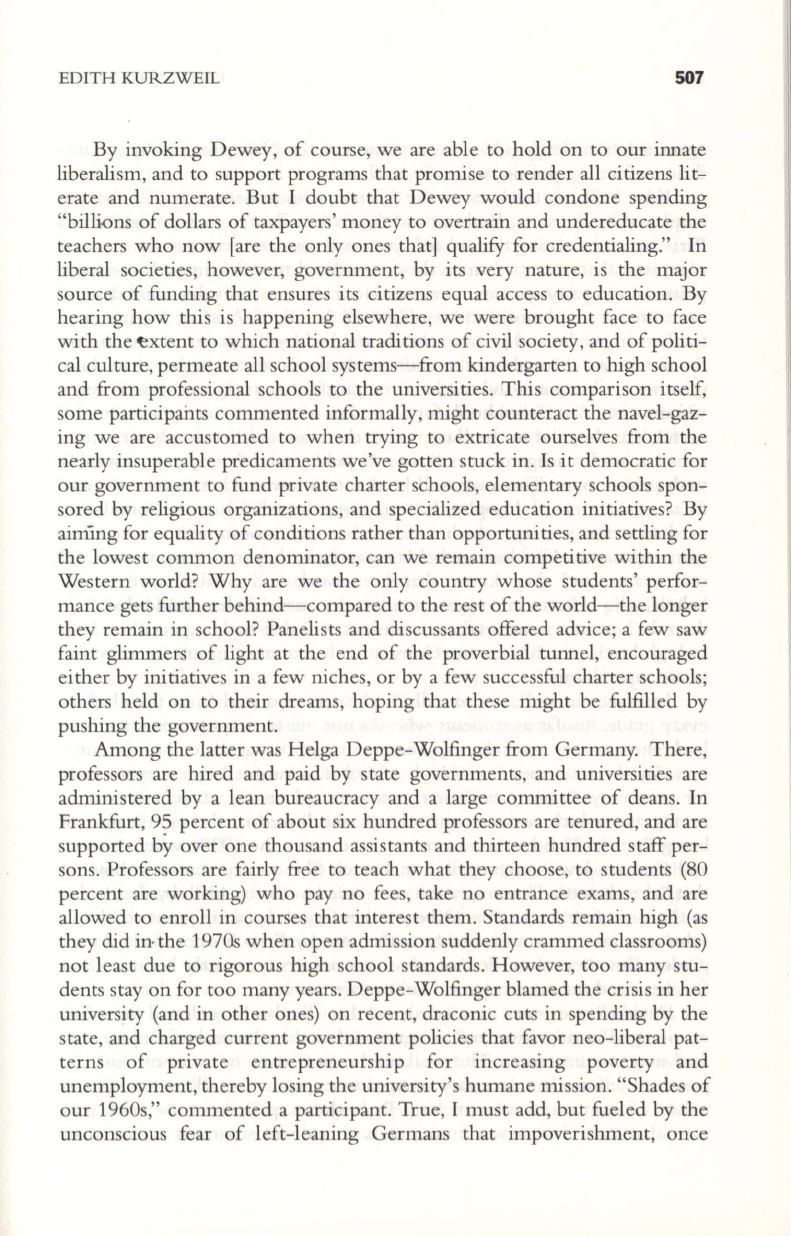
EDITH KURZWEIL
507
By invoking Dewey, of course, we are able to hold on to our innate
liberalism, and to support programs that promise to render all citizens lit–
erate and numerate. But I doubt that Dewey would condone spending
"billions of dollars of taxpayers' money to overtrain and undereducate the
teachers who now [are the only ones that] qualifY for credentialing."
In
liberal societies, however, government, by its very nature, is the major
source of funding that ensures its citizens equal access to education. By
hearing how this is happening elsewhere, we were brought face to face
with the
~xtent
to which national traditions of civil society, and of politi–
cal culture, permeate all school systems-from kindergarten to high school
and from professional schools to the universities. This comparison itself,
some participants commented informally, might counteract the navel-gaz–
ing we are accustomed to when trying to extricate ourselves from the
nearly insuperable predicaments we've gotten stuck in. Is it democratic for
our government to fund private charter schools, elementary schools spon–
sored by religious organizations, and specialized education initiatives? By
aiming for equality of conditions rather than opportunities, and settling for
the lowest common denominator, can we remain competitive within the
Western world? Why are we the only country whose students' perfor–
mance gets further behind-compared to the rest of the world-the longer
they remain in school? Panelists and discussants offered advice; a few saw
faint glimmers of light at the end of the proverbial tunnel, encouraged
either by initiatives in a few niches, or by a few successful charter schools;
others held on to their dreams, hoping that these might be fulfilled by
pushing the government.
Among the latter was Helga Deppe-Wolfinger from Germany. There,
professors are hired and paid by state governments, and universities are
administered by a lean bureaucracy and a large committee of deans.
In
Frankfurt, 95 percent of about six hundred professors are tenured, and are
supported by over one thousand assistants and thirteen hundred staff per–
sons. Professors are fairly free to teach what they choose, to students (80
percent are working) who pay no fees, take no entrance exams, and are
allowed to enroll in courses that interest them. Standards remain high (as
they did in· the 1970s when open admission suddenly crammed classrooms)
not least due to rigorous high school standards. However, too many stu–
dents stay on for too many years. Deppe-Wolfinger blamed the crisis in her
university (and in other ones) on recent, draconic cuts in spending by the
state, and charged current government policies that favor neo-liberal pat–
terns of private entrepreneurshi p for increasing poverty and
unemployment, thereby losing the university's humane mission. "Shades of
our 1960s," commented a participant. True, I must add, but fueled by the
unconscious fear of left-leaning Germans that impoverishment, once


